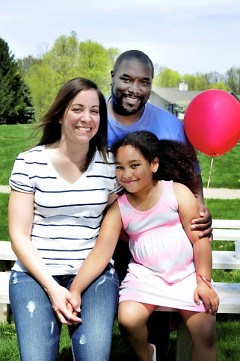D.A. Blodgett – St. John’s, an organization devoted to providing refuge and support for children and families, will be having their monthly Foster Care and Special Needs Adoption Program Orientation on April 14 for people interested in becoming foster parents or adoptive parents.
Attendees will learn about foster care licensing, what foster care in Kent County is all about, the process for entering child care and what they can get as far as support from D.A. Blodgett – St. John’s.
“The rules for the foster care licensing program are set forth by Michigan legislature,” says Deb Disler, foster home licensing department manager. “What we are responsible for is to go through each rule with each family and make sure their home meets all those needs.”
With the 500 rules Michigan’s legislature requires, among them are how much bedroom space the house has, the physical structure of the home, carbon monoxide detectors and water temperature.
After orientation, training and a family assesment, families are then matched up with a child. This process can take six months to three years.
D.A. Blodgett’s main goal for foster care is to provide a temporary home for the child until they are able to reunite them with their biological family.
“More kids are here due to neglect than abuse,” says Disler. “Our goal is to try and get them back with their biological family when they are able to take them.”
Children waiting to be adopted in their special needs adoption program are children who have not been matched up with a family and need a permanent home due to their parents’ rights being terminated.
“People may get the wrong idea when they hear 'special needs,'” says Joy Engelsman, adoption program manager. “Special needs can mean emotional behavior, physical and mental.”
Anyone can view the children currently waiting to be adopting on D.A. Blodgett – St. John’s website. A mini biography of them is accompanied with their photo.
A medically fragile case is a boy named Joshua who is 20 months old. Born with Di George Syndrome, he requires around the clock care, as he is tracheostomy and ventilator dependent. It is required that he has two trained caregivers available at all times and his adoptive family must live a maximum of two hours away from a children’s hospital.
While his case is considered special needs, others are not as severe. In the case of 16-year-old Logan, he seems like your average teenage boy after reading his biography. One thing he is working on is learning how to maintain his composure when dealing with daily stressors, and his adoptive family will need to have experience parenting teenagers with emotional needs.
“There are not a lot of restrictions when it comes to adopting except on the type of family they are,” Disler says. “For example, in Joshua’s case they would have to be trained prior to adopting.”
A need that isn’t currently stated on their website are families willing to adopt sibling groups. When the parents’ rights are terminated they are often in sibling groups, according to Engelsman.
“A lot of people that come to us for adoption say they want one or two kids, so when we have a sibling group of three or more it’s hard,” says Engelsman. “We don’t have a lot of families right now that are approved and waiting for sibling groups.”
Other services D.A. Blodgett – St. John’s provides includes counseling services, a big brothers and big sisters program and a children’s outpatient program.
The Foster Care and Special Adoption Program Orientation will be on April 14 from 6:30 p.m. to 8:30 p.m. in their North Conference Room at D.A. Blodgett – St. John’s (805 Leonard Street NE). No registration is required.
For questions regarding the orientation call Deb Disler at 616-451-2021 or contact her by email.
The Rapidian, a program of the 501(c)3 nonprofit Community Media Center, relies on the community’s support to help cover the cost of training reporters and publishing content.
We need your help.
If each of our readers and content creators who values this community platform help support its creation and maintenance, The Rapidian can continue to educate and facilitate a conversation around issues for years to come.
Please support The Rapidian and make a contribution today.


